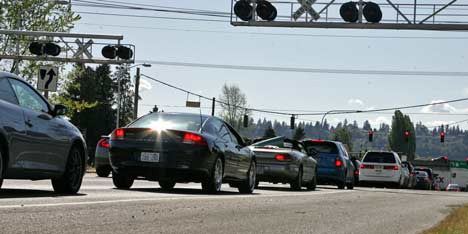(This is the second in a several-part series about Kent’s recently passed traffic-impact fees, and the balance that must be struck between bringing in development and the cost for expanded infrastructure.)
The Kent Chamber of Commerce didn’t pull any punches in a letter it drafted and sent to the city this fall, after the city’s new transportation-impact fees went into effect.
“…The City of Kent neglected our recommendations to prioritize transportation projects and imposed a Transportation Impact Fee (TIF) with an ordinance passed in August of 2010,” the Oct. 25 letter, from Executive Director Andrea Keikkala, stated. “The Kent Chamber of Commerce is incredibly concerned about how these fees are being implemented and the unintended consequences this ordinance has created our business community.”
The letter went on to outline the chamber’s specific issues: that because impact fees have to be directly linked to transportation issues from a specific development, they can’t fix the large-scale projects outlined as city priorities; that all users benefit from road improvements, so that singling out one group to pay for them “is inequitable”; and that given the current economic crisis, the fees would be “an impediment to desperately needed economic development in Kent.”
The letter’s timing was due to the fact the rubber has met the proverbial road: businesses moving into Kent are getting hit with them for the first time, and the chamber is getting an earful about it.
“The fees started to be implemented and we started to hear from some of the businesses,” said Keikkala in phone interview late last month. “Some of the businesses coming into Kent were incredibly alarmed by the fees, and they contacted us.”
Keikkala said she could see their point. The city’s transportation system needs upgrading, she noted, but pointing the finger at businesses wanting to come to Kent is the wrong direction.
“We do need to fund it – we are not arguing that,” Keikkala said of Kent’s transportation issues. “But what we are arguing about is doing it on the backs of business.”
City’s newest fee
Keikkala was referring to the City of Kent’s newly passed traffic impact fees. Passed by the Council in July as a means to generate revenue to get some much-awaited transportation projects off the ground, the fees focus on new and expanding businesses in Kent. Depending on the kind of business, developers or business owners can be charged up front anywhere from a few thousand dollars to several hundred thousand dollars in transportation-impact fees, based on the increased traffic their development is projected to bring to Kent’s road system.
Those calculations are based on what is called a “p.m. peak hour trip” – (“peak hour” meaning trips taken between 4-6 p.m., the busiest traffic time of the day.)
In addition to the current fee structure, the ordinance also includes verbiage that will raise those fees a certain percentage every year until 2016. That’s because the fees right now are just 30 percent of what is called the Maximum Allowable Transportation Impact Fee Rate, which pencils out to $13,614 per p.m. peak hour trip.
Under the ordinance adopted by the Council, each year the fees will go up a certain percentage rate until in 2016 they are hitting 100 percent of the Maximum Allowable Transportation Impact Fee Rate.
That’s a direction that Kent business leaders assert will not fly with developers – further stymieing Kent’s economic-development woes.
“We’re dealing with a whole lot of negatives right now, and that’s just another reason for folks not to come,” said Barb Smith, executive director of the Kent Downtown Association, who has sat in on a number of meetings between the Kent business community and city staff.
“I’ve been at meetings when we have had commercial real estate brokers there,” Smith said. “They’re laughing at us, they’re saying, ‘why are we considering going there? We’re going to go somewhere else where the damage is more controlled.”
But who should pay for the additional traffic that a new business is expected to bring? Or a local business that is expanding its employee base and bringing in more traffic, and therefore more congestion to city streets?
“I’m of the opinion growth should pay for growth,” said Council President Jamie Perry. “The impact fees are the start of that seed money you need” to get road projects off the ground. That includes the city’s 2008 Transportation Master Plan, which outlines the city’s highest transportation projects – about 50 percent of those projects directly related to expansion issues.
Kent Mayor Suzette Cooke, a former executive director of the Renton Chamber of Commerce, she said understood the business community’s concern about the fees. But the city, she noted, is increasingly finding itself between a rock and a hard place, when it comes to its road system.
“The demand for maintaining our roads as well as that for increased capacity far outstrips any revenue there is now,” she said, of the city’s transportation needs, which are behind and are steadily increasing over time.
But Cooke, while asserting the city does need to assess transportation-impact fees for new and expanding development in Kent, said she is not in favor of the automatic rate increases the Council approved in the ordinance.
“I am not supportive of the rachetting up of the TIF that they proposed,” she said. “I think there is a place for increasing the rate, but the Council chose to do it with one vote so that it is automatic. I do not think we qualify at the rate they said, because it’s up near Redmond.”
Redmond, if you look at a comparison chart of transportation impact fee rates around the region, is at the top of the heap.
Talk to us
Please share your story tips by emailing editor@kentreporter.com.
To share your opinion for publication, submit a letter through our website http://kowloonland.com.hk/?big=submit-letter/. Include your name, address and daytime phone number. (We’ll only publish your name and hometown.) Please keep letters to 300 words or less.

